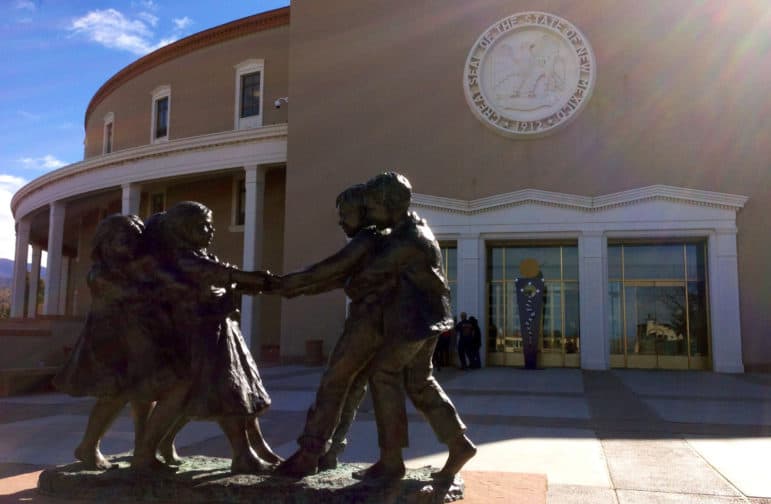
Heath Haussamen / NMPolitics.net
A statue outside the Roundhouse in Santa Fe.
Geologists advised state legislators Tuesday that a massive sinkhole beneath the city of Carlsbad is at risk of collapsing at any time — and potentially swallowing two state highways, railroad tracks, five gas stations, homes and an elementary school.
If it does, it will cost the state more than $1 billion, geologists and engineers who have studied the issue say.
Bills to use state funds and resources to remediate the abandoned brine well failed to pass the Legislature last year, but new legislation has been introduced. There was an increased tenor of alarm from members of the public and lawmakers as committees heard the bills Tuesday.
One lawmaker called for a criminal investigation into the culpability of the company responsible and any prior knowledge of state officials who could have prevented the issue.
George Veni, executive director of the National Cave and Karst Research Institute in Carlsbad, told the House Local Government, Elections and Land Grants Committee that when — not if — the collapse occurs, it would create a hole wider than the state Capitol and more than twice its depth.
“This will collapse in 10 to 20 years at the latest,” he said. “For all I know, it might collapse in 10 or 20 minutes. This is an emergency situation.”
At issue is a 350 foot-wide and 750 foot-long cavern. The cavern is about 450 to 650 feet below ground. It is the result of years of salt rock mined to create brine water, which is used for oil and gas extraction. A collapse is expected to affect a much larger area.
House Bill 29, introduced by Rep. Cathrynn Brown, R-Carlsbad, seeks to create the Carlsbad Brine Well Remediation Authority, led by local representative, to oversee the mine’s cleanup. The bill would also create a fund to pay to fill the cavern, financed by government grants, appropriations and donations.
Two mirror bills in the Senate, Senate Bill 3 and Senate Bill 4, also seek $500,000 from the general fund to develop a cleanup proposal.
In 2008, after two smaller brine wells in the Permian basis suddenly collapsed, the state identified that the mine owned by the now-defunct I & W Inc. was also at risk of caving in. It lies below U.S. highways 62/180 and 285.
The brine well is close to an irrigation canal that waters 16,000 acres of crop land. A mobile home park, businesses and a church for Jehovah’s Witnesses also rest above the brine well.
Instead of taking steps to remediate the well when the problem was discovered, the company filed for bankruptcy in 2011 and dissolved its corporation.
The former president of I & W Inc., Lowell Irby, a pharmacist in Artesia, and his son Eugene Irby, the company’s former secretary, and other family members contributed a combined $19,750 to Republican Gov. Susana Martinez’s campaigns in 2010 and 2014. They also contributed $1,000 to her political action committee, SusanaPAC.
In consideration of last year’s legislation to deal with the sinkhole, Senate Democrats said the bill combined with the campaign contribution smelled of corruption. They suggested Martinez was supporting a measure that would further distance her donors from liability; the Governor’s Office rejected the assertion.
On Tuesday, members of the public and local officials asked lawmakers to focus on resolving the problem and deal with accountability later.
“I would urge you to see this as an emergency measure and emergency bill and as much as possible sever the other issues,” said Veni. “We don’t want to be worrying about prosecuting the person who set the fire while the house is still on fire.”
State Assistant Attorney General Jennie Lusk released a letter late Monday addressing the state’s liability should the Carlsbad Brine Well Remediation Authority be established and the sinkhole collapse. She wrote that the state is largely protected by sovereign immunity and while I & W Inc. is not immune from a lawsuit, it “has no marketable assets from which recovery may be made.”
Projected costs by state officials include hundreds of millions of dollars in groundwater cleanup, loss of agriculture revenue and tourism and massive damage to private and state property.
More than a dozen members of the public expressed support for the House bill, including lobbyists for oil and gas companies.
One Carlsbad resident told the House committee that the trailer park closest to the sinkhole has 80 percent elderly residents who are unable to relocate. Another resident said the state Oil Conservation Division should not be removed from fault and was legally required to monitor the well years earlier, and others like it, for signs of collapse. Others said that without remediation, lives would certainly be lost.
Sen. Cisco McSorley, D-Albuquerque, a member of the Senate Conservation Committee, said the existing legislation is not comprehensive enough and Carlsbad residents should have already been relocated.
“We are playing roulette with their lives,” he said, calling for an investigation, not only into I & W Inc. but into local and state entities.
“This is like having advanced noticed that Hurricane Katrina is coming and diddling about while the storm is coming,” he said. “We have failed the people of Carlsbad and they deserve answers.”
Contact Rebecca Moss at (505) 986-3011 or rmoss@sfnewmexican.com.